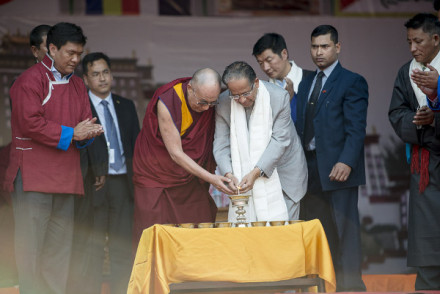 GUWAHATI: Tibetan spiritual leader, His Holiness the Dalai Lama, today inaugurated a first-ever Festival of Tibetan Arts & Culture here at Srimanta Sankaradeva Kalashetra in Guwahati, Assam. The chief minister of Assam, Tarun Gogoi, invited as the guest of honour shared the dais with the Sikyong Dr. Lobsang Sangay, the political successor to His Holiness the Dalai Lama and Arunachal Pradesh Minister of Tourism & Rural Work Department Pema Khandu at the inaugural ceremony.
GUWAHATI: Tibetan spiritual leader, His Holiness the Dalai Lama, today inaugurated a first-ever Festival of Tibetan Arts & Culture here at Srimanta Sankaradeva Kalashetra in Guwahati, Assam. The chief minister of Assam, Tarun Gogoi, invited as the guest of honour shared the dais with the Sikyong Dr. Lobsang Sangay, the political successor to His Holiness the Dalai Lama and Arunachal Pradesh Minister of Tourism & Rural Work Department Pema Khandu at the inaugural ceremony.
Pema Khandu, son of late Arunachal Pradesh Chief Minister Dorjee Khandu, a long-standing supporter of Tibet, who is the chief patron of the organising committee extended his heartiest thanks to His Holiness the Dalai Lama, the Chief Ministers of both Assam and Meghalaya in rendering all possible support for making the event a huge success. “The main endeavour of the festival is to showcase the rich cultural heritage of Tibet and bring it closer to the mind of the people of Assam. Its (Tibet) people, religion, art and culture went through extreme turbulent times but managed not only to survive but flourish in lands far away from its origin”, it’s an inspiration to draw from, particularly for we the people of North East who are confronting modernity at the cost of our own rich culture and heritage,” Pema Khandu said in his welcome address.
In his address, Chief Minister of Assam Tarun Gogoi said it is a great honour and privilege for the Assam to host the first ever Tibet festival with the presence of His Holiness the Dalai Lama and Sikyong Dr. Lobsang Sangay.
The chief minister praised His Holiness the Dalai Lama as a great leader of humanity and one who is concerned for the welfare of human beings throughout the world. He said His Holiness the Dalai Lama’s message and blessings will usher peace, harmony and end of insurgency and hatred in Assam.
The Tibetans have a very rich cultural heritage and it will help towards promoting peace and brotherhood in Assam, the chief minister said.
Addressing the gathering, His Holiness the Dalai Lama said Tibet has an ancient civilisation, culture and history according to the findings of archaeologists and Chinese researchers.
The Tibetan Buddhism originated from India in the 7th century and flourished with the arrival of top Indian scholars such as Padma Sambhava and Shantarakshita. We Tibetans, as reliable students of India, have kept alive the Buddhist culture.
The Tibetan culture, language and religion are facing grave danger of extermination under the restrictions imposed by some hardliners in the Chinese government, His Holiness the Dalai Lama said, Tibetans inside Tibet have maintained a compassionate attitude towards Chinese despite difficult circumstances. He said the festival of Tibet will help in raising awareness about the protection of Tibet’s rich cultural heritage, which is on the verge of dying under the Chinese rule. On an optimistic note, he said around 400-500 million Chinese are connected and taking growing interest in Tibetan Buddhist culture.
Describing Tibetan Buddhist culture as a culture of peace and compassion, His Holiness said it is relevant and helpful in today’s world affected by violence. So, I thank the organisers for organising this Tibet festival.
The inaugural function also had traditional dance performances by Tibetan, Monpa and Bhutanese dance troupes.
Mr Karma Yeshi and Ms Yangchen Dolkar, members of Tibetan Parliament-in-Exile and organising committee of the festival, also addressed the gathering on the occasion.
The five-day Tibet Festival will showcase Tibetan sand mandala and butter sculpture creations; display and sale of intricate thangka paintings, assiduous wood carving and handicrafts, exhibition of rare photographs and books and Tibetan medical camp was also set up, talks on Tibetan culture and Buddhism, performance of traditional dances etc. The Tibet Museum of the Department of Information & International Relations of the Central Tibetan Administration in Dharamsala organised photo exhibitions on Tibetan culture and history titled “Long Look Homeward and Why Tibetans to Turning Self-Immolation.”
Sikyong Dr. Lobsang Sangay will grace the closing ceremony of the festival on 6 February.
